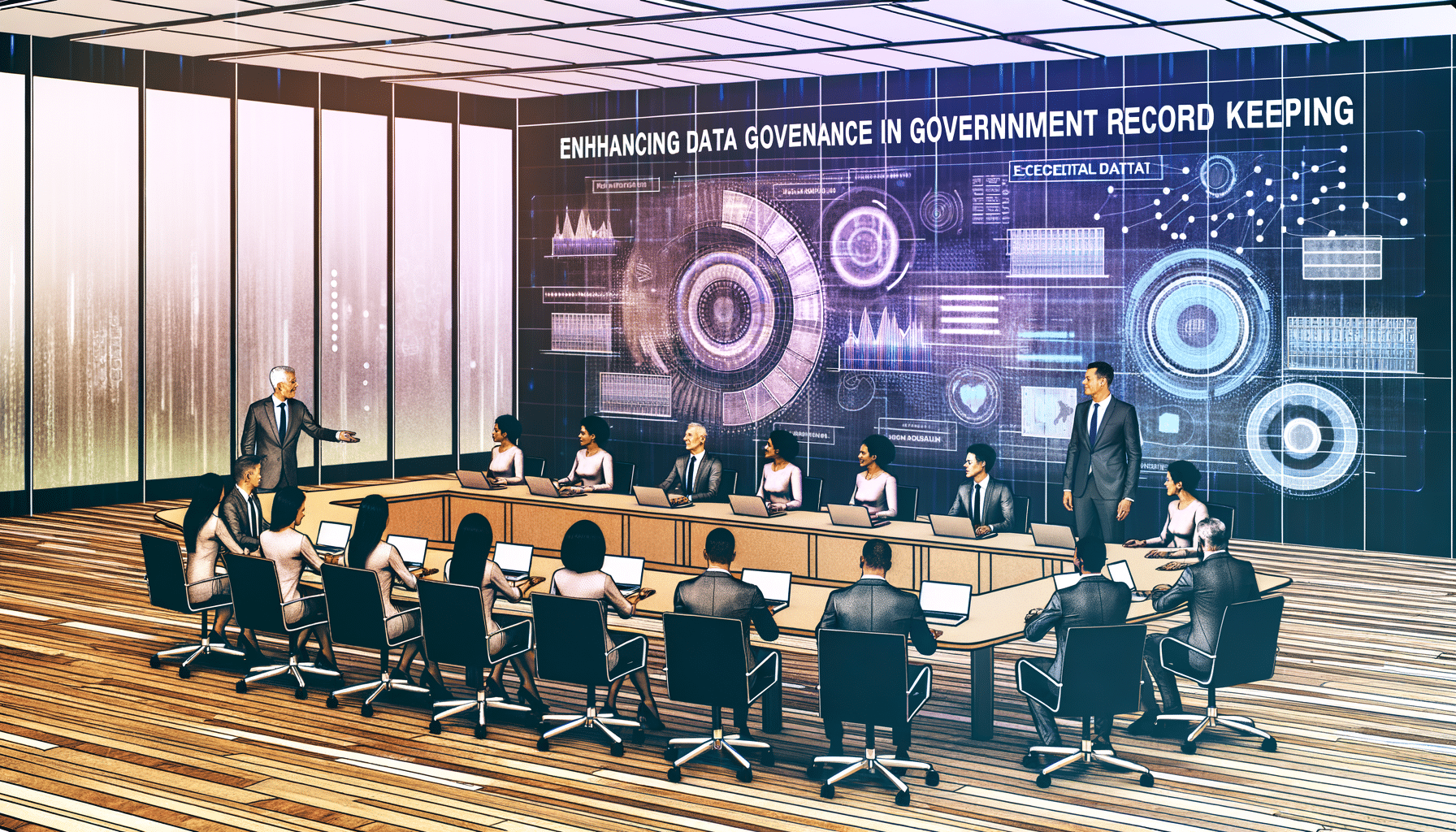- Governance Policies
- June 13, 2024
Enhancing Data Governance in Government Record Keeping

Revolutionizing Data Governance in Government Record Keeping
In the constantly evolving realm of data management, governance remains a cornerstone, particularly in the public sector. I’ve observed many challenges over the years in how government departments handle and secure data. As data becomes increasingly integral to operational effectiveness, ensuring stringent data governance is not just prudent—it’s essential. By embracing innovative technologies like blockchain and AI, we can significantly enhance the mechanisms of record keeping, ultimately transforming how government functions at its core.
The Imperative for Strong Data Governance in Government
Governments generate vast amounts of data daily, from public records and legal documents to sensitive financial data and operational statistics. This data is more than just information—it’s a critical asset that drives policy-making, informs public services, and upholds transparency. Yet, for this data to remain useful and secure, robust data governance models must be in place. Effective data governance ensures that data is accurate, consistent, secure, and accessible, thereby fostering trust and efficiency within government operations.
Challenges in Traditional Government Record Keeping
The traditional methods of government record keeping have long been fraught with inefficiencies and risks. These include:
- Fragmented Data Storage: Often, data resides in siloed systems, making integration a Herculean task.
- Lack of Automation: Manual categorization and retrieval processes are slow and prone to error, leading to inaccuracies.
- Security Vulnerabilities: With sensitive information at stake, inadequate security measures can lead to unauthorized access and data breaches.
- Diverse Compliance Requirements: Different laws and regulations govern data storage and handling, complicating compliance efforts.
Overcoming these challenges requires a paradigm shift towards more innovative, technology-driven solutions.
Harnessing AI and Blockchain for Enhanced Governance
Innovation at RecordsKeeper.AI combines AI and blockchain to tackle these challenges head-on, modernizing how government entities manage their records.
Automated Data Categorization and Retrieval
AI technology automatically categorizes and tags records, making data retrieval not only faster but also more accurate. This automation minimizes human error and enhances the reliability of data across departments. Imagine a world where data can be effortlessly accessed with a simple natural language query—this is the future we are building.
Immutable and Secure Data Storage
Blockchain integration offers an unparalleled layer of security. With its decentralized ledger, it ensures that records remain tamper-proof and immutable. This functionality is particularly invaluable in government settings, where the integrity of data must be beyond reproach to maintain public trust.
Streamlined Compliance Management
Regulatory compliance is an area where RecordsKeeper.AI truly shines. By automating regulatory workflows, government offices can systematically ensure adherence to policies such as GDPR, HIPAA, and SOX. Customized notifications and detailed audit logs assist compliance teams in maintaining oversight and quickly addressing any potential issues.
Strategy Towards Implementing Enhanced Data Governance
Successfully revolutionizing government data governance with AI and blockchain involves several key strategies:
- Assessment of Current Systems: Begin with a rigorous audit of existing data systems to identify pain points and opportunities for integration with new technologies.
- Technology Adoption Strategy: Develop a comprehensive plan that outlines the gradual implementation of AI and blockchain technologies, ensuring minimal disruption to existing operations.
- Training and Development: Equip government personnel with the necessary skills to leverage new technologies effectively, emphasizing continuous improvement and resilience.
- Partnerships and Collaboration: Engage with tech providers and industry experts to stay ahead of technological advancements and best practices.
The Path Forward
The implementation of advanced data governance solutions in government record keeping is not just a strategic advantage—it’s a necessity. By leveraging AI and blockchain technologies, governments can achieve greater efficiency, compliance, and security. At RecordsKeeper.AI, I am proud to lead the charge in making these innovations a living reality. We are not just transforming record management; we are transforming governance itself.
As you forge ahead in enhancing data governance in your own departments, I invite you to explore how RecordsKeeper.AI can be a pivotal partner. Together, we can redefine the future of public sector record keeping.
For further insights and guidance on modernizing your data governance strategies, feel free to follow my journey and connect with me.
Toshendra Sharma is the visionary founder and CEO of RecordsKeeper.AI, spearheading the fusion of AI and blockchain to redefine enterprise record management. With a groundbreaking approach to solving complex business challenges, Toshendra combines deep expertise in blockchain and artificial intelligence with an acute understanding of enterprise compliance and security needs.
Archives
- December 2024
- November 2024
- October 2024
- September 2024
- August 2024
- July 2024
- June 2024
- May 2024
- April 2024
- March 2024
- February 2024
- January 2024
- December 2023
- November 2023
- October 2023
- September 2023
- August 2023
- July 2023
- June 2023
- May 2023
- April 2023
- March 2023
- February 2023
- January 2023
- December 2022
- November 2022
- October 2022
- September 2022
- March 2019
Want to get more content like this?
Signup to directly get this type of content to your inbox!!
Latest Post
Organizing External Auditor Access
- December 22, 2024
Document Control in Manufacturing Plants
- December 21, 2024
Handling Rush Financial Report Requests
- December 20, 2024
Managing Record Access After Staff Changes
- December 19, 2024





